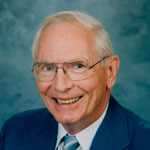Burton M. Wheeler, PhD, professor emeritus of English and of religious studies, both in Arts & Sciences, and a beloved teacher and former dean of the College of Arts & Sciences at Washington University in St. Louis, died Friday, Feb. 17, at his home in Warson Woods, Mo., after a long battle with cancer. He would have turned 85 March 12.

Wheeler began his career at WUSTL in 1956 as an instructor of English and of religious studies.
In addition to his teaching and research, he held a number of administrative positions at WUSTL, including dean of the College of Arts & Sciences from 1966-1978 and chair of the Committee on Religious Studies for more than 20 years.
Wheeler was much admired by students. In a 1994 Washington People
Record profile, he was described as always having time for students and as being “warm,” “fair,” “inspiring” — “a model of the humane scholar and teacher.”
“Burt interacted with many students, offering advice both complimentary and critical in an even tone,” says Michael W. Friedlander, PhD, professor of physics in Arts & Sciences and Wheeler’s friend since they both joined the WUSTL faculty in 1956. “He was a man of integrity, a valued colleague. No campus should be without its ‘Burt.’”
Students organized a “Burt Wheeler Day” on May 11, 1971, in Brookings Quadrangle to recognize his many contributions toward improving undergraduate education as well as his efforts toward bridging the gap between faculty and students.
He was presented with a Superman cape, an apple tree and many speeches throughout the day and hundreds of students and faculty enjoyed a picnic, a student-faculty softball game, gunnysack races and volleyball in the Quad. There also was a dinner held that evening at the Whittemore House in his honor.
Among his contributions included introducing the Freshman Advising Program and developing FOCUS, a one-year program that offers first-year students close relationships with professors and students who have similar interests in humanities-based study.
In addition, he established a working relationship between the Council of the Students of Arts & Sciences (CSAS) and the Faculty Council, providing students for the first time an integral part in determining academic policy and curriculum change.
He received a special award from CSAS in 1996 for his continuous support of the student-run organization since its founding in the late 1960s. He also received the CSAS Award for Distinguished Teaching in 1987 and the CSAS Award for Administrative Service to Students in 1978.
Wheeler, who was promoted to assistant professor and assistant chair of the Department of English in 1961, also served as director of Freshman Composition from 1960-62.
From 1962-65, he served as faculty master of Forsyth Houses (the residence halls in the South 40), supervising general residence hall administration and directing a program designed to encourage intellectual activity outside the classroom and allow for greater student-faculty contact.
In 1966, when he was named dean of the College of Arts & Sciences, he also was promoted to associate professor of English. He became professor in 1976 and emeritus professor in 1996.
A specialist in 19th- and 20th-century literature, he wrote a book-length study of novels of social protest in Great Britain in the 19th century. The courses he taught ranged from the literature of the English bible, to Utopian literature, to the ethics of genetic engineering.
He was chair of the Commencement committee from 1989 until his retirement in 1996, serving as the grand marshal of Commencement for six of those years. He also served as interim dean of the Washington University Libraries from 1988-89 and chaired the Task Force on Undergraduate Education in the early 1990s.
Recognizing his impact
His impact on the Washington University community has been recognized in a number of ways, including a residence hall building and two awards named in his honor.
The Burton M. Wheeler House, one of three South 40 buildings that make up the William Greenleaf Eliot College, opened in 1998.
Both a teaching fund from which grants are given by the College of Arts & Sciences and a Phi Beta Kappa freshman book award bear Wheeler’s name.
The son of a Southern Baptist minister who grew up in Mullins, S.C., Wheeler earned a bachelor’s degree in 1948 and a master’s degree in 1951, both in English from the University of South Carolina.
He earned a doctorate in English in 1961 from Harvard University, where he was a teaching fellow in English and general education for three years before joining the WUSTL faculty.
While Wheeler was called into administrative duties at WUSTL often, teaching remained his passion.
In the Washington People profile, he is quoted as saying that “Even during the time I’ve been in what were allegedly 100 percent administrative jobs, I’ve insisted on the right to teach at least one class and I want to go out as a teacher. This is what a university is for. That is where I get my greatest pleasure.”
He received the distinguished faculty award at the university’s Founders Day celebration in 1972 in recognition of outstanding teaching and scholarship.
After Wheeler’s wife, Jackie, of more than 50 years was diagnosed with Alzheimer’s disease in 1994, he began writing about the experience of being her primary caregiver as a form of self-therapy.
He was encouraged to publish the manuscript, resulting in the 2001 book Close to Me, But Far Away, a realistic but loving look at his relationship with his wife, who died Feb. 25, 2005.
He is survived by two sons, Paul of New York, N.Y., and Geoffrey of Menomonie, Wis.; a daughter, Kristin Wheeler of Warson Woods; and a grandson, Cody Hess, of Warson Woods.
A memorial service will be held on campus at a later date.